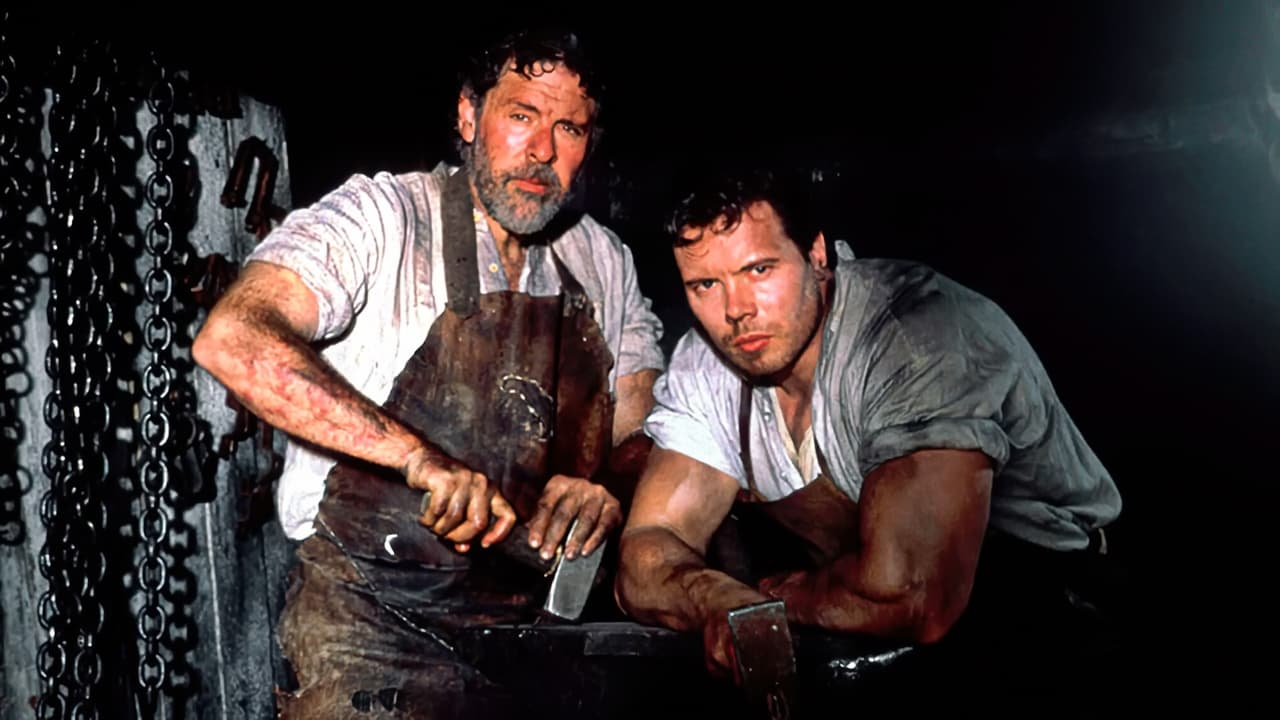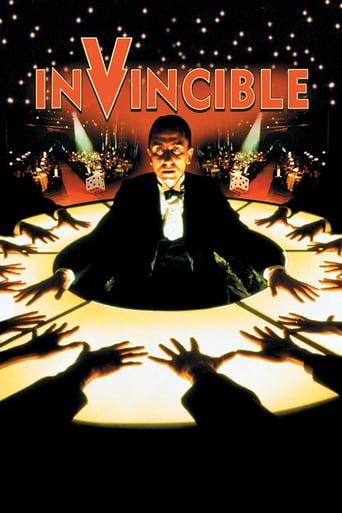

The two major flaws in this are evident from the start: a hamfisted script and some wooden acting particularly from the lead, a muscle bound body builder whose performance makes Arnold Schwarzenegger look like Lawrence Olivier. Perhaps he should not be blamed since the script, by the director himself (not surprising really, this is very much a vanity project) is as clunking as could be and certainly would not have been made if anyone other than the director had written it. The dialogue is mechanical and obvious for the most part; the director is not a very skillful writer. That this piece is not completely without merit is down to the interest of the premise, although "Based on a true story" is somewhat stretching the facts. "Very loosely based on a character who actually existed albeit at a different time and place (he died in America)" would be more like it. The scenes in the club with Tim Roth as the occultist Hannusen (rather closer, though not really close, to the historical character) are the most interesting partially I guess due to the inherent fascination of Nazi occultism and there is a good feel for period here. But the plot gets jumbled up in vague ideas which do not go anywhere or lead to predictable outcomes: Jellies as souls and later crabs as...what? A feel good platonic (?) romance with a frustrated concert pianist leading to the inevitable performance. Tim Roth's obvious secret. I guess 'predictable' is really the word for this. Everything is pretty much spelt out in the script before it happens. There are some deft cinematic touches here and there, but not enough to sustain interest.
... View MoreThere are two very interesting stories struggling to get out of this long, weirdly subdued and studiously undramatic movie. Unfortunately, neither of them manage to break free.Based on a true story, Invincible tells the tale of Zishe Breitbart (Jouko Ahola), a young Polish Jew who leaves his hometown in 1932 to become a strongman on the stage in Berlin, Germany. Lured to Berlin by dreams of the world and a mysterious woman, Zishe becomes a star attraction at a club called the Palace of the Occult. There he meets Hanussen (Tim Roth), the owner of the club and what we would today call a "mentalist". He performs feats of hypnosis, clairvoyance and mind reading for his Nazi-filled audience. Zishe also meets Marta (Anna Grouari), a young piano player who is married to Hanussen and silently suffers under his mistreatment. At first, Hannusen forces his gigantic Jew to portray an Aryan superman, thrilling his supposed German brothers with his example of physical greatness. But Zishe eventually throws off that facade and enrages the Nazis who believe no Jew could or should be that strong. Zishe's example inspires Berlin's Jewish community and the show becomes more popular than ever. Zishe comes to tire of Berlin life and after a decidedly non-explosive confrontation with Hannusen, he returns to Poland and desperately tries to warn his fellow Jews about the threat he sees coming from Germany. The strongman isn't much of a speaker, however, and finds it hard to convince anyone but his little brother Benjamin (Jacob Wein).If Invincible had either focused more strongly on the German preoccupation with the occult or on Zishe's struggle to spread a warning about Nazism when he returned to Poland, this might have been a very good movie. I t doesn't do nearly enough with either, though, and wallows in a wholesome, boring stupor. This is one case where a film based on a true story would have been far better off taking a few liberties with the facts to construct a firmer, more dynamic narrative. Invincible is less a work of entertainment and more an educational film you'd show kids in Hebrew school, and I bet they'd find it as tedious as I did.The fascination with the occult of the Nazis and German society as a whole is an aspect of pre-WWII Germany that hasn't gotten a lot of serious attention in drama. Outside of the outlandish take seen in Hellboy and the "find the magical MacGuffin" elements of the first and third Indiana Jones movies, this is a rare aspect of the Nazis that hasn't been done to death. And Invincible does something quite intriguing with it. It weaves the personal story of Hanussen trying to exploit Nazi superstition for his own benefit into a look at why the occult became such an object of interest in pre-war Germany. The film suggests that Germans still suffering from the aftermath of WWI saw the supernatural as a way of recapturing the greatness they thought they had lost. After military defeat, economic ruin and political impotency, the supposedly mystical powers of someone like Hanussen were a dark beacon drawing in Germans who had lost their faith in the real world. Unfortunately, the movie doesn't spend enough time with Roth and the Nazis to get any further into the subject than I have in this review.The story of Zishe returning to Poland and desperately trying to convey the real menace of the Nazis to his disbelieving fellow Jews could also have made for one heck of a movie. But Invincible spends about 5 minutes on that before moving on. What could have been a poignant struggle against skepticism that the Nazis could really be that bad and with Zishe's own inarticulateness is dispensed with in a cursory fashion. Imagine if all the killings at the end of The Godfather happened off screen and were only referred to by other characters and that's sort of how it feels in this film.Poor storytelling choices aside, Invincible probably never had a chance to be any good once Jouko Ahola was cast as Zishe. Now, the role is that of a huge muscle man, so it's not like Tim Roth could have played the part. But Ahola is distractingly terrible. His performance would get him laughed off the stage during a high school play. He makes Dolph Lundgren look like a master thespian. Not only can't he act, Ahola has absolutely no screen presence at all. I don't know how drunk writer/director Werner Herzog was when he decided to use someone this talentless and flat as his main character, but I'd bet that instead of measuring the level of alcohol in his blood, you'd have to measure the level of blood in his alcohol.This movie has to be remade. There's simply too much about the basic story that's obviously captivating to allow it to remain stuck in this well-intentioned but unfocused and ill-considered trial of a film.
... View MoreI bought this DVD purely on a lets-give-it-a-try basis, knowing only a few supporting actors, and of course, Tim Roth and Werner Herzog.I cant say I was disappointed with any of the two: Roth delivers a solid performance as usual, and Herzog manages (although barely) to display his straightforward, albeit compelling, style of telling stories, that keeps both the average movie-going folks, and his more artsy fans, happy and debating the qualities and faults.This movie would work much better in German, instead of English - a poor choice of Herzog, in my opinion. The awkwardness does add to the atmosphere, up to a certain point, but not all the way.The same goes for the acting: Roth may seem a bit over the top, but there wasn't really much more that he could do - Ahola and Gourari are below any acting standard, and without pushing his part to the limit, the movie would be as plain as its storyline. To a great extent, Roth carries the story and the movie on his shoulders, from his appearance, until his chilling monologue at the court.However, much of the rest doesn't really make sense, especially after the first half, when our "hum, how refreshing and original" tolerance has worn out. Anna Gourari and Jacob Wein cant act to save their lives, and some scenes, especially towards the end, like the confrontation at the boat, or the speech at the village, seem just cartoonish and laughable.The story is also to blame. Some people may leave this movie convinced that they have watched a "true" story, but as any small research will tell you, Breitbart died years before, never met Hanussen, went to the USA, and sold his strength method, Charles Atlas' style. Herzog chose to make a lively tale out of this, where Breitbart foresees the nazi horrors, etc, while living a 'simple' life - but even without knowing better, the final result looks oversimplified.A final word for Jouko Ahola - at first, I thought he was just some weightlifter, casted somewhat by accident (after listening to Wein and Gourari, one loses all faith in this casting), but he does fit this role with great merit. Extremely real and likable, one doubts that he is even acting - is Ahola playing Breitbart, or is Ahola playing himself, with a borrowed name? He does add to the movie's magic, despite falling short in all the moments that demand more from his acting, than his muscles. But like with his character, I wonder if thats really his fault, or Hanussen/Herzog's fault - like he says, he is «just strong». So strong, in fact, that the real Breitbart looks small in comparison, and so do all the other characters, with the exception of Roth, that he lifts in the air like a child, but without whom he would be lost - in the story, and in the movie.Too bad, that his strong arms cant lift this movie above its rather simplistic premises. Just the first half, Herzog's attention to detail (the shtetl, 1930's Berlin), Roth and Ahola's performances, each for its own reasons, and a few lasting scenes - Breitbart's first performance, breaking the chains and bending the sword, with the music - make this movie a hard 7.
... View MoreIt is really a great disappointment to see such an interesting director as Werner Herzog doing such a conventional and uninteresting film.The story is set in Poland and Berlin in the year before the Nazis ascended to power in Germany. Zisa, a Jewish strongman from Poland goes to Berlin and becomes involved in the cabaret shows of magician and fortune teller Hanusse, first playing the role of an 'aryan' here and then as a new Jewish 'Samson'. Unfortunately this allegedly true story is treated in the most conventional and stereotype way one could imagine, without any dramatic tension, character development or historical revelation. Poland's Jewish shtetl is idealized as in some Shalom Alechem inspired story without the charm of Shalom Alechem. Berlin between the two wars lacks the fascination and spark of many good movies that dealt with th etime and place and is populated by operetta villains Nazis. Hanussen is a fascinating character, but here he is uni-dimensional and makes us long for the mysterious and complex view we got from him in Istvan Szabo's 'Hanussen'. Moreover history is twisted, Hanussen is killed in the movie in 1932, while in reality he was assassinated in 1933 a few weeks after the Nazis came to power. Some dream scenes haunt the hero during the movie but they do not succeed to transmit any emotion or message.If Herzog had made this film at the beginning of his career I would have doubted his talent. Having done as a mature director, after he already proved what a fine director he can be is really the only mystery around this movie.
... View More